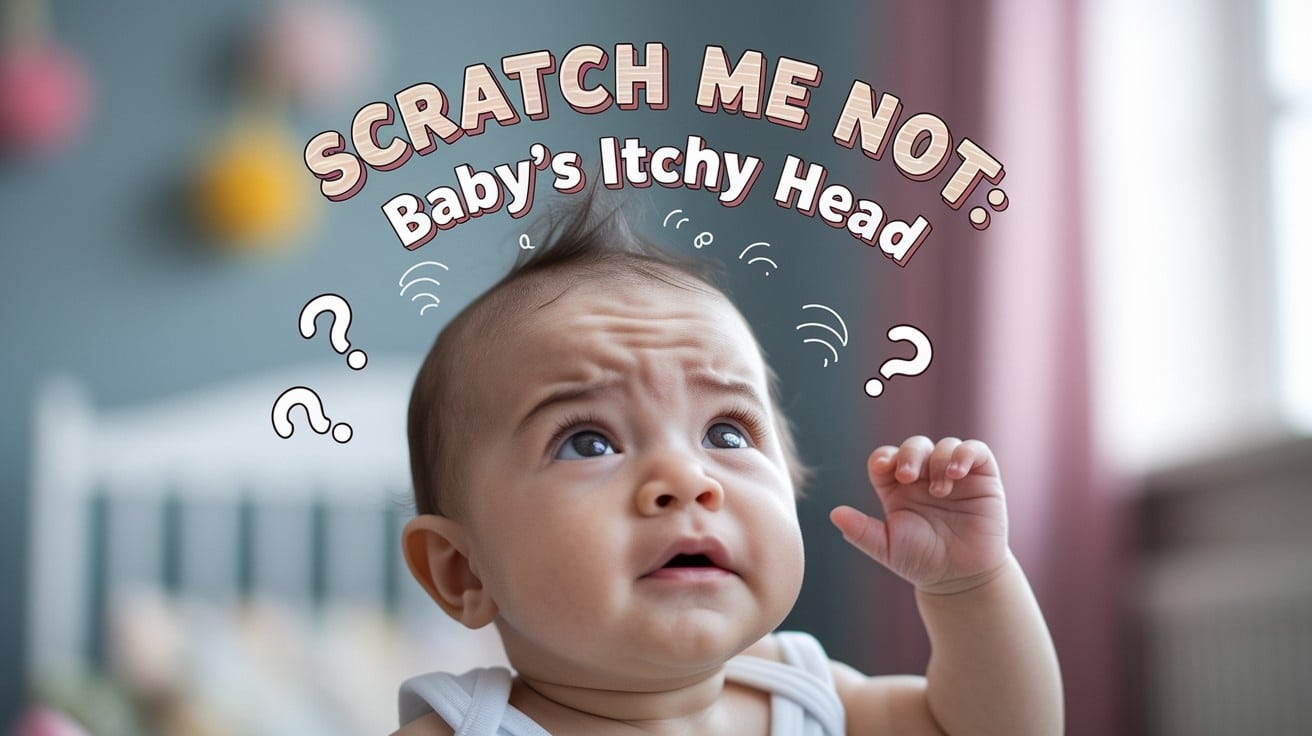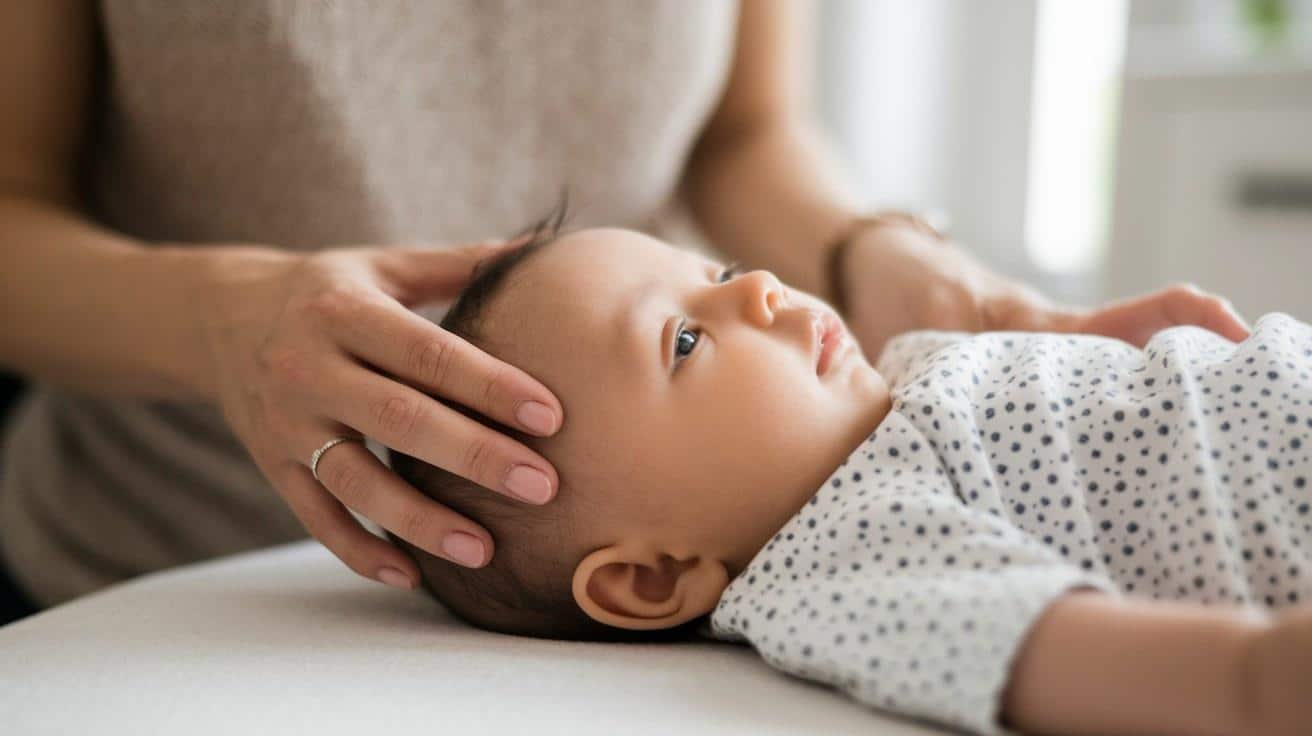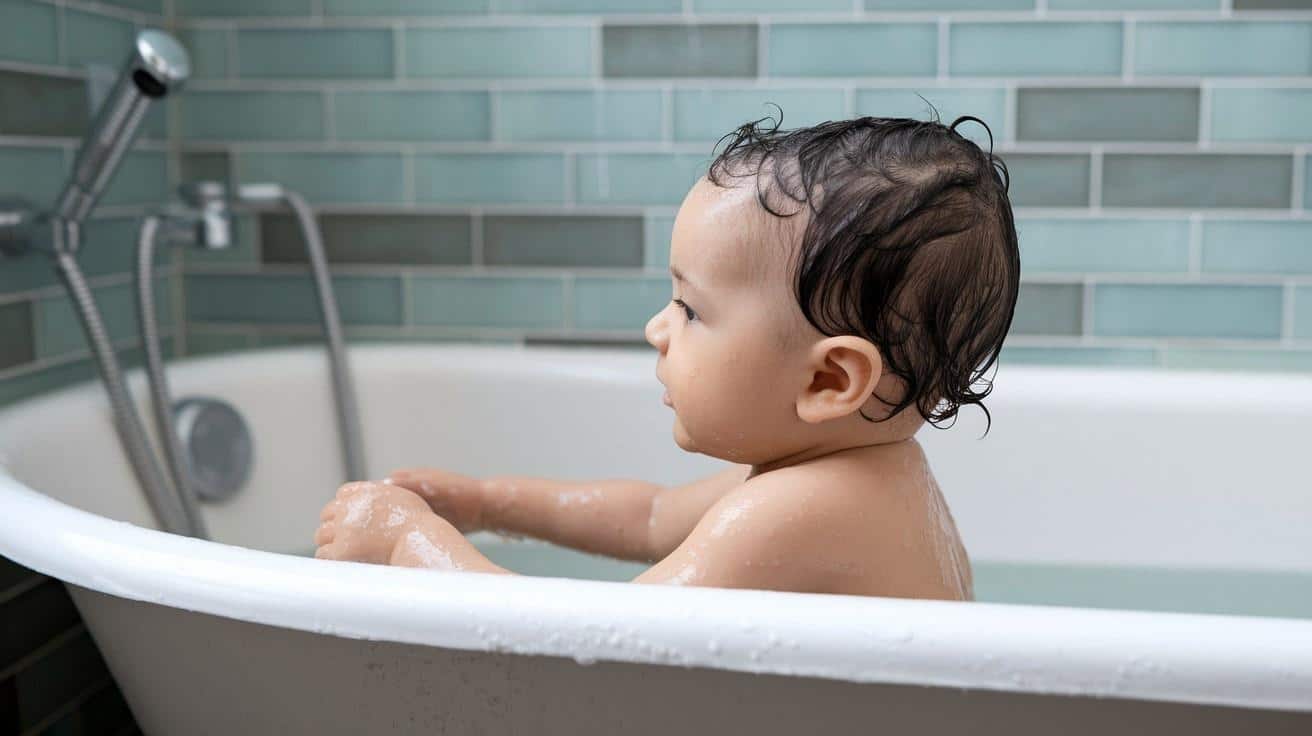
Ever noticed your little one scratching away at their scalp like they’re solving a particularly puzzling baby equation?
You’re not alone! Nearly 70% of infants develop some form of head-scratching behavior during their first year.
While watching your baby scratch can trigger worry, it’s typically a normal part of development as babies discover their bodies and sensations. Some scratching is your curious explorer testing out their newly-uncovered hand control.
However, persistent scratching might signal common issues like dry scalp, cradle cap, or mild irritation from products.
Did you know that Babies have super-sensitive skin that’s about 30% thinner than adult skin?
This guide will explore why babies scratch their heads, when it might warrant medical attention, and practical solutions to keep your little one comfortable and their scalp healthy.
Why Is My Baby Scratching Head?
Babies scratch their heads for several developmentally normal reasons. As they gain motor control, they practice new skills and explore their bodies through touch.
This scratching behavior provides interesting sensory feedback that helps them understand cause and effect relationships. Many infants use head scratching as a self-soothing technique when tired or overstimulated, finding comfort in the repetitive motion.
Your baby might also be fascinated by the novel sensation of touching their scalp or hair.
What begins as random exploration can sometimes develop into habitual patterns, particularly during developmental leaps, though these habits typically fade as new skills emerge.
This common behavior represents your baby’s natural curiosity and growing awareness of their body and the sensations they can create.
When to Worry About Baby Scratching Head: Warning Signs

Occasional head-scratching is normal for babies as they explore their bodies, but certain signs warrant medical attention.
Scratching that Leads to Bleeding: Scratching breaks the skin, creating an entry point for bacteria. If you notice blood or open wounds from your baby’s scratching, gently clean the area with warm water.
Signs of Infection: Monitor scratched areas for increasing redness, swelling, warmth, or discharge. These are classic signs of infection requiring prompt medical evaluation.
Persistent Itching: If your baby constantly scratches despite intervention, it could indicate an underlying condition like eczema, cradle cap, or allergies. Persistent scratching may require specialized creams or treatments.
Sleep Disturbances: When scratching interferes with sleep or causes noticeable discomfort, consult your pediatrician. Disrupted sleep from itching can affect your baby’s development and mood.
Common Causes of Baby Scratching Head
When babies scratch their heads, it’s often a natural behavior but can sometimes indicate underlying issues. Dry skin and cradle cap are common culprits, causing flaky patches that create itchiness on a baby’s sensitive scalp.
Eczema presents as red, irritated skin that becomes increasingly uncomfortable for children.
Various factors, including genetics and environmental elements, can trigger this inflammatory condition.
Teething discomfort sometimes manifests as head scratching when babies try to relieve the strange new sensations in their mouth and jaw. The pain can radiate upward, causing them to paw at their head.
Various allergens from bath products to laundry detergents might trigger itching reactions. Always consider recent changes in products used around your baby.
Though uncommon in infants, head lice can cause intense itching and should be ruled out if scratching persists despite other interventions.
How to Stop Your Baby from Scratching Their Head?

Babies often scratch their heads due to dry skin, cradle cap, or simple curiosity about their new abilities. This behavior is typically harmless but can occasionally lead to skin irritation or infection.
1. Trim Those Tiny Nails
Keep your baby’s nails short and smooth using specialized baby nail clippers.
File any rough edges with a soft emery board to prevent accidental scratches. The best time to trim nails is when your baby is sleeping or feeding, as they’re less likely to squirm.
Remember to cut fingernails along the natural curve and toenails straight across to avoid ingrown nails.
2. Protective Coverings
Soft cotton mittens or caps can provide a gentle barrier when scratching becomes persistent. These work especially well during sleep when you can’t monitor your baby’s movements.
Choose breathable fabrics to prevent overheating and ensure the mittens fit snugly but not too tight. Remove mittens occasionally to let your baby explore their hands, which is important for sensory development.
3. Moisturize Regularly
Apply baby-safe, fragrance-free moisturizers to keep your little one’s scalp hydrated. Proper hydration significantly reduces itchiness that triggers scratching behavior.
Look for products containing natural ingredients like aloe vera or coconut oil. Apply moisturizer after bath time when skin is slightly damp to lock in hydration.
4. Eliminate Irritants
Switch to hypoallergenic products for bathing and laundry. Many standard products contain chemicals that can irritate sensitive baby skin and worsen scratching. Avoid fabric softeners and opt for a second rinse cycle when washing baby clothes.
Pay attention to any correlation between new products and increased scratching to identify potential allergens.
5. Gentle Scalp Care
Carefully wash your baby’s head with mild shampoo. For cradle cap, gently massage the scalp with oil before removing flakes with a soft brush.
Don’t pick at crusty patches, as this can cause discomfort or infection. Use warm (not hot) water and limit shampooing to 2-3 times per week to avoid drying out the scalp.
Home Remedies and Products for Baby Skin Care

Coconut oil offers natural moisture for your baby’s soft skin without harsh chemicals. It can help with dry patches, cradle cap, and minor irritations while being gentle enough for daily use.
Fragrance-free, mild baby shampoos are essential for sensitive skin, as artificial scents can trigger irritation or allergic reactions. Look for products labeled “tear-free” and “hypoallergenic” for the safest bathing experience.
Oatmeal baths provide remarkable relief for itchy skin conditions like eczema or heat rash.
Grind plain, unflavored oats into a fine powder and add to lukewarm bathwater for a soothing soak that won’t strip natural oils.
Cool compresses can quickly calm inflamed or irritated skin. Use a soft cloth dampened with cool water (never ice-cold) and gently place it on the affected areas for 5-10 minutes to reduce redness and discomfort without medication.
Easiest Home Remedy: Warm oatmeal baths provide immediate, gentle relief for most baby skin irritations with minimal effort.
Preventing Future Head Scratching

Establishing healthy scalp habits early helps prevent discomfort and chronic conditions as your baby grows. Consistency with gentle care routines creates the foundation for lifelong scalp health.
1. Regular Scalp Care
Create a gentle cleansing routine using fragrance-free baby shampoo 2-3 times weekly. Massage the scalp softly with fingertips to remove dead skin cells without damaging soft skin.
Brush your baby’s hair daily with a soft-bristled brush to improve circulation and prevent buildup.
This also helps distribute natural oils evenly across the scalp.
2. Hydration and Healthy Baby Skincare Routine
Apply a small amount of medical-grade petroleum jelly or specialized baby oil after bath time.
These create a protective barrier that locks moisture in and keeps irritants out.
Maintain indoor humidity levels between 40% and 60% during dry months. A properly humidified room prevents excessive dryness, which can trigger flaking and itching.
3. Monitoring for New Products or Allergies
Introduce new skincare products one at a time with a 5-day waiting period. This methodical approach helps pinpoint potential irritants should a reaction occur.
Keep a simple journal noting new foods, environmental changes, and any scalp reactions.
Early pattern recognition is your best tool for preventing recurring problems before they become habits.
When to See a Pediatrician?
Parents should seek pediatric care promptly when home remedies fail to improve their child’s condition. Persistent symptoms warrant professional evaluation, especially if they worsen over 24-48 hours despite appropriate home treatment.
Contact your pediatrician immediately if your child develops an unexplained rash, unusual swelling, or experiences hair loss.
These symptoms can indicate allergic reactions, infections, or other underlying conditions requiring medical expertise.
Never hesitate to call when your baby shows signs of discomfort or develops a fever. Infants under three months with any fever (100.4°F or higher) need immediate medical attention. For older babies, persistent fevers lasting more than two days or temperatures above 102°F should prompt a call to your doctor.
Trust your parental instincts—you know your child best. When something doesn’t seem right, professional medical guidance provides both answers and peace of mind.
The Last Note
Babies scratch their heads for various normal reasons including dry skin, cradle cap, developing coordination, self-soothing, or mimicking adults.
Temperature regulation or reactions to new hair growth can also trigger this behavior. Most head scratching is harmless and resolves naturally as your baby grows.
However, trust your parental instincts when something seems concerning. Excessive scratching that causes bleeding, appears painful, or accompanies other symptoms like fever warrants medical attention. Remember that you know your baby best.
Pediatricians are always available to address concerns and provide reassurance. Even if the issue turns out to be minor, seeking professional advice can provide peace of mind as you guide the wonderful journey of parenthood.
If you’re interested in more informational content on mothers and babies, feel free to click here and explore other blogs that you might enjoy.
